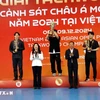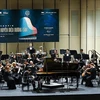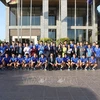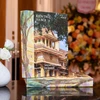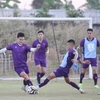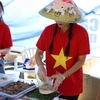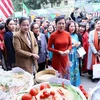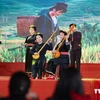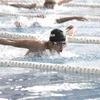Central province of Quang Tri, the theatre of fiercest battles during the American War, is home to about 80 percent of the country's physically disabled people, but its sports programme has been a "magical wand" changing their lives and even creating many champions in the process.
Ho Thi Hue won a gold medal for acing a 200m swim at the1988 Paralympics, held in the Republic of Korea. Hue lost a leg in a labour accident in 1984 but undaunted, she practiced for glory in a local pond, which was in fact a crater filed with rainwater made by American bombs.
These days there is more than just crater ponds to help Quang Tri's disabled community strive for gold and improve the quality of their lives.
Sports facilities are well developed in the province's Dong Ha city and Phung Xuan Quy, chairman of the province's Association of Sports for the Disabled, said he hopes to reach even more people.
With assistance and funds from the US charity organisation East Meets West, he hopes to see more facilities built in the near future.
According to Quy, sport is very popular in the community thanks to positive effects it brings to them.
Nguyen Dinh Hai, a 20-year-old man with symptoms of cerebral palsy as a result of Orange Agent, has stopped his unruly, out-of-control behaviour after getting involved in sport earlier this year.
Hai asked to join in with the sporting activities after he watched other disabled residents in the province getting training, which he thought looked like fun.
"Sport has cured his symptoms and now he behaves in a normal way," Quy said.
Quy affirmed that sport improved the social attitudes towards the disabled in the province, where many were affected by Agent Orange or disabled while tilling crops on their land by shells and mines left behind from the war.
"Sport helps increase awareness of the disabled in society as well as assists the disabled to gain recognition from local authorities," he said.
"Sport alone has improved the lives and physical and psychological health of 37,000 disabled people in the province, including 6,100 children," Quy said, calling for more investment from authorities as well as support from charity organisations.
"Sporting activities offer improved health conditions and bring them more happiness in life. But the most important factor is the chance for socialising."
Training in sports, including athletics, swimming and badminton, started eight years ago when local authorities found it was a good therapy for the disabled.
"Swimming is the favourite, as it requires little cost to use the facilities and the province has many lakes and rivers," said Quy.
For Ho Thao, swimming has changed her life. The 20-year-old was born with a severely impaired visual capacity thus she stayed home a lot and failed to follow all classes at a local primary school.
Things changed after Thao won two gold medals for the freestyle 100m and 200m at a national swim meet held in Ho Chi Minh City in November last year, as part of a national competition of sports for the disabled.
"Trips to Ho Chi Minh City and then visiting cool Da Lat city right after the competition made me love traveling and talking to people," she said.
With cash awards from her success, she bought an electric bike in order to commute to a local massage centre run by blind people, meaning she could embrace a degree of independence and become less reliant on her family, easing the burden on them.
The association plans to have swimming clubs for 60-70 disabled swimmers.
Nguyen Luong Quy of Dong Luong ward, who has a paralysed hand, said swimming improved his mental capacity a great deal. "People now look at me in a different light after I won a gold medal," he said.
Ho Thi Hue won a gold medal for acing a 200m swim at the1988 Paralympics, held in the Republic of Korea. Hue lost a leg in a labour accident in 1984 but undaunted, she practiced for glory in a local pond, which was in fact a crater filed with rainwater made by American bombs.
These days there is more than just crater ponds to help Quang Tri's disabled community strive for gold and improve the quality of their lives.
Sports facilities are well developed in the province's Dong Ha city and Phung Xuan Quy, chairman of the province's Association of Sports for the Disabled, said he hopes to reach even more people.
With assistance and funds from the US charity organisation East Meets West, he hopes to see more facilities built in the near future.
According to Quy, sport is very popular in the community thanks to positive effects it brings to them.
Nguyen Dinh Hai, a 20-year-old man with symptoms of cerebral palsy as a result of Orange Agent, has stopped his unruly, out-of-control behaviour after getting involved in sport earlier this year.
Hai asked to join in with the sporting activities after he watched other disabled residents in the province getting training, which he thought looked like fun.
"Sport has cured his symptoms and now he behaves in a normal way," Quy said.
Quy affirmed that sport improved the social attitudes towards the disabled in the province, where many were affected by Agent Orange or disabled while tilling crops on their land by shells and mines left behind from the war.
"Sport helps increase awareness of the disabled in society as well as assists the disabled to gain recognition from local authorities," he said.
"Sport alone has improved the lives and physical and psychological health of 37,000 disabled people in the province, including 6,100 children," Quy said, calling for more investment from authorities as well as support from charity organisations.
"Sporting activities offer improved health conditions and bring them more happiness in life. But the most important factor is the chance for socialising."
Training in sports, including athletics, swimming and badminton, started eight years ago when local authorities found it was a good therapy for the disabled.
"Swimming is the favourite, as it requires little cost to use the facilities and the province has many lakes and rivers," said Quy.
For Ho Thao, swimming has changed her life. The 20-year-old was born with a severely impaired visual capacity thus she stayed home a lot and failed to follow all classes at a local primary school.
Things changed after Thao won two gold medals for the freestyle 100m and 200m at a national swim meet held in Ho Chi Minh City in November last year, as part of a national competition of sports for the disabled.
"Trips to Ho Chi Minh City and then visiting cool Da Lat city right after the competition made me love traveling and talking to people," she said.
With cash awards from her success, she bought an electric bike in order to commute to a local massage centre run by blind people, meaning she could embrace a degree of independence and become less reliant on her family, easing the burden on them.
The association plans to have swimming clubs for 60-70 disabled swimmers.
Nguyen Luong Quy of Dong Luong ward, who has a paralysed hand, said swimming improved his mental capacity a great deal. "People now look at me in a different light after I won a gold medal," he said.











